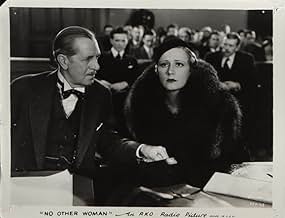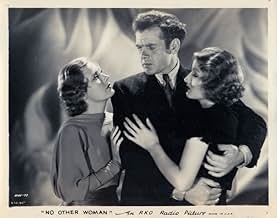अपनी भाषा में प्लॉट जोड़ेंA steelworker and his aspiring wife make millions when they become partners in a dyeworks. Unfortunately, success does not bring happiness.A steelworker and his aspiring wife make millions when they become partners in a dyeworks. Unfortunately, success does not bring happiness.A steelworker and his aspiring wife make millions when they become partners in a dyeworks. Unfortunately, success does not bring happiness.
- पुरस्कार
- कुल 1 जीत
Theodore von Eltz
- Sutherland
- (as Theodore Von Eltz)
Jules Cowles
- Boarder
- (बिना क्रेडिट के)
Phyllis Fraser
- Minor Role
- (बिना क्रेडिट के)
Arthur Hoyt
- Bridge Player
- (बिना क्रेडिट के)
Mary Mason
- Minor Role
- (बिना क्रेडिट के)
फ़ीचर्ड समीक्षाएं
Irene Dunne stars as a factory-town woman who wants a better life (like Barbara Stanwyck in Stella Dallas, Katharine Hepburn in Alice Adams and Joan Crawford in Possessed). She's in love with factory worker Charles Bickford. They marry and she runs a boarding house to make extra money. One of the boarders is a shy immigrant (Eric Linden) who has discovered a great new dye. Dunne talks Bickford into throwing in their savings and open a dye works. They become rich. But Bickford travels a lot and falls into the clutches of a bad woman (Gwili Andre) who wants more than money: marriage.
The court room finale is a doozy with J. Carroll Naish playing a sleazy (Italian in this case) lawyer who has cooked up a scheme to get his girl friend (Andre) married to Bickford. So they line up a bunch of false witnesses against Dunne. But Dunne turns the tables when they try to grab custody of the baby as well. Excellent plot twist.
Dunne is one of the greats, and she's terrific here too. She's even believable as a factory-town girl. Bickford is an acquired taste and I never liked him as a "leading man." Linden is good is his usual "soft" role. And Naish is always fun to hate. Leila Bennett, Hilda Vaughn, and Christian Rub co-star.
No Other Woman is famous as the film that derailed Danish Gwili Andre's career because her character is so nasty. She battled for another decade to regain a foothold in films but only landed small parts. She committed suicide in 1959 by surrounding herself with publicity photos and press clippings and setting them and herself on fire.
The court room finale is a doozy with J. Carroll Naish playing a sleazy (Italian in this case) lawyer who has cooked up a scheme to get his girl friend (Andre) married to Bickford. So they line up a bunch of false witnesses against Dunne. But Dunne turns the tables when they try to grab custody of the baby as well. Excellent plot twist.
Dunne is one of the greats, and she's terrific here too. She's even believable as a factory-town girl. Bickford is an acquired taste and I never liked him as a "leading man." Linden is good is his usual "soft" role. And Naish is always fun to hate. Leila Bennett, Hilda Vaughn, and Christian Rub co-star.
No Other Woman is famous as the film that derailed Danish Gwili Andre's career because her character is so nasty. She battled for another decade to regain a foothold in films but only landed small parts. She committed suicide in 1959 by surrounding herself with publicity photos and press clippings and setting them and herself on fire.
is a highlight of this short-but-snappy soaper. Irene Dunne (great as usual) plays an ambitious woman who pushed husband (Charles Bickford) to partner with friend (Eric Linden) to create successful business. But Bickford has a yen for babes and links up with a conniving one (Gwili Andre) who pressures him to get a divorce. Film culminates in nasty divorce led by hateful lawyer (J. Carroll Naish). Somehow this all works even tho is pretty far-fetched. Chalk up another success for Irene Dunne.
No Other Woman is sure one misnomer of a title. This rather dated soap opera
has Charles Bickford caught between two of them.
First there's Irene Dunne, his wife who saw him through the lean years as he starts a new steel business with young chemist Eric Linden and bore his son Buster Miles. But Bickford never quite changed his partying ways and now that he's rich he carouses on a grander scale.
Enter Gwili Andre a slinky society minx who gets his mojo going and when Bickford's libido is aroused he's obeying what's coming from below decks.
Given the liberalization of divorce laws now, this film is quaintly old fashioned and a lot of younger viewers might not understand what's going on. But back in the day you had to prove allegations made in court and a lot of dirty linen got exposed. Then as now a lot of shaky allegations were made.
Irene Dunne is the noble wife who is ready to defend home and hearth from the intruder in court or anywhere else. A most typical role for her. The climax is the divorce case brought on by Bickford and his lawyer J. Carrol Naish. Naish really steals the film in the end as the kind of shyster that lawyer jokes are made out.
No Other Woman is dated and quaint, but still good entertainment.
First there's Irene Dunne, his wife who saw him through the lean years as he starts a new steel business with young chemist Eric Linden and bore his son Buster Miles. But Bickford never quite changed his partying ways and now that he's rich he carouses on a grander scale.
Enter Gwili Andre a slinky society minx who gets his mojo going and when Bickford's libido is aroused he's obeying what's coming from below decks.
Given the liberalization of divorce laws now, this film is quaintly old fashioned and a lot of younger viewers might not understand what's going on. But back in the day you had to prove allegations made in court and a lot of dirty linen got exposed. Then as now a lot of shaky allegations were made.
Irene Dunne is the noble wife who is ready to defend home and hearth from the intruder in court or anywhere else. A most typical role for her. The climax is the divorce case brought on by Bickford and his lawyer J. Carrol Naish. Naish really steals the film in the end as the kind of shyster that lawyer jokes are made out.
No Other Woman is dated and quaint, but still good entertainment.
Irene Dunne was rarely paired with actors like Charles Bickford. Here he is a handsome, sweaty blue collar man who thinks -- but rarely with anything above his neck. Irene is kind of in love with him but also is loyal to the effete character played by Eric Linden.
Dunne and Bickford are an appealing couple but if ever a couple entered a marriage doomed to failure, it is the two they play.
He shows how dumb he is by throwing over the stylish, intelligent Dunne for Gwyli Andre -- a nobody in the story and in the history of film.
This is a standard women's picture in some ways. In others, it is a powerful drama. It doesn't seem dated and most assuredly warrants watching.
Dunne and Bickford are an appealing couple but if ever a couple entered a marriage doomed to failure, it is the two they play.
He shows how dumb he is by throwing over the stylish, intelligent Dunne for Gwyli Andre -- a nobody in the story and in the history of film.
This is a standard women's picture in some ways. In others, it is a powerful drama. It doesn't seem dated and most assuredly warrants watching.
I saw(?) this flick once before on the tube, but the reception on the station was so bad, I had to wait for it to come on again. It was a good wait, but it came around again. Irene Dunne and Charles Bickford were probably the only ones around who could'a pulled this one off. Bickford works at the mill, marries Dunne, works hard for the money, but somehow is just not satisfied with life. He's a lucky stiff though, as Irene Dunne-- as was wont of wives in those days--stuck with him through the thick and the thin of it. What is more incredulous is the rags to riches to rags aspect of this film. Bickford finances a new type of dye developed by the young upstart living in the family boarding house, and becomes a millionaire in the process. Yeah...right !! Still more incredulous--if not audacious--is the court scene where a very nasty divorce takes place, replete with witnesses who have been 'greased' to render perjured testimony...the whole nine yards. Bickford flies too close to the Sun with wings made of wax and...you can fairly well imagine the rest. It could'a worked, if the story had been a bit more developed, and if the film had been somewhat longer. This was essentially a character study which failed to study its characters with any depth.
क्या आपको पता है
- ट्रिवियाAt the wedding reception, guest are seen pinning money on Anna's dress before dancing with her. This was a common practice in Polish immigrant communities and was called the "money dance." Sometimes the bride wears an apron or carries a purse in which to place the money. The purpose of the money is for the couple's honeymoon, to set up housekeeping, or for the couple's first-born child.
- गूफ़The shadow of the camera can be seen falling on people at the wedding as it moves around the room.
- भाव
Anna Stanley: To your dying day, you'll work in the mill.
Jim Stanley: Sure! Why not?
Anna Stanley: Like your father did, and mine. And your children will go on doing the same thing, and their children...
Jim Stanley: Hey - what is all this tripe?
- कनेक्शनRemake of Just a Woman (1925)
टॉप पसंद
रेटिंग देने के लिए साइन-इन करें और वैयक्तिकृत सुझावों के लिए वॉचलिस्ट करें
विवरण
- रिलीज़ की तारीख़
- कंट्री ऑफ़ ओरिजिन
- भाषा
- इस रूप में भी जाना जाता है
- Just a Woman
- फ़िल्माने की जगहें
- बर्मिंघम, अलबामा, संयुक्त राज्य अमेरिका(TCI Ensley Works - steel mill exteriors after wedding reception)
- उत्पादन कंपनी
- IMDbPro पर और कंपनी क्रेडिट देखें
- चलने की अवधि
- 58 मि
- रंग
- पक्ष अनुपात
- 1.37 : 1
इस पेज में योगदान दें
किसी बदलाव का सुझाव दें या अनुपलब्ध कॉन्टेंट जोड़ें





































